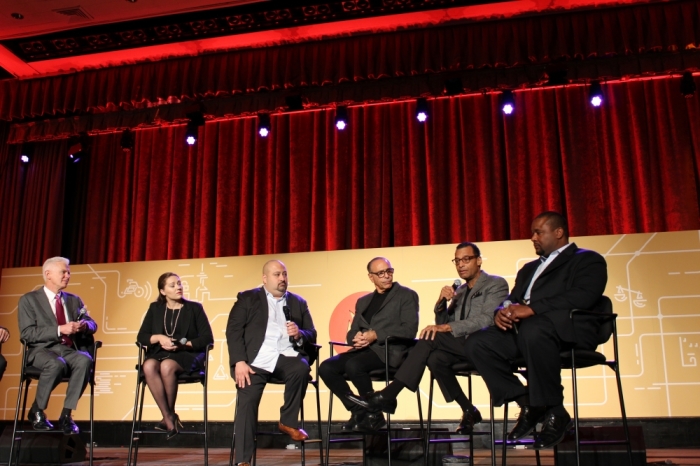A.R. Bernard's Father Rejected Him, Now He's a Model Father With a Legacy

"We've been in succession for 20 years, it started in 2000 when he came to me and said, 'Dad, I'm ready.' We (he and his wife) recognized the call of God on his life. And I said 'great' and he said 'What do I do?' and I said 'I want you to become an usher' and he was very upset with that. And I said to him 'I want you to learn all of the operations of the ministry. The business aspect of the ministry, the management aspect of the ministry, either you're blessed with an oracle gift or you can develop skill. But you gotta know how to run things," Bernard explained.
"So he worked in every single department in our ministry and seven years later we had a conversation and he said, 'You coulda told me what you were doing.' And I said, 'Hey, wax on, wax off,'" he quipped to a laughing audience.
"I did not get mad at ushering," replied Jamaal to more laughter. "My father, I remember from the beginning, he was the choir, he was the ushers, he was the logistics department. So for me to do that wasn't a problem, I just asked him if he would have just told me why. I felt like Daniel (from 1984 movie 'The Karate Kid') dealing with Mr. Miyagi and he was telling him to paint the fence, 'I'm not trying to paint the fence, I wanna learn karate,'" he said.
"All of a sudden I wanted to learn ministry and I didn't understand that the basis of ministry is service. So when we talk about legacy, he was very intentional. He didn't tell me what we were doing but he was very intentional. ... When you start establishing legacy, especially in the context of the church, it takes a collaborate effort starting from the head all the way down to operations. Every entity plays a part in developing a next generation for the church," added Jamaal.
Establishing the legacy and relationship between Jamaal and his father, however, didn't come without some head-butting.
"I think one of the biggest challenges my father would have is learning which hat I wanted to talk to. He's my father, he's my spiritual father, he's my boss, and sometimes I just want to come to him man to man. Let's just have a conversation. And, no offense, when he used to reprimand us he used to have the Bible with him," Jamaal said.
He said he would say sometimes: "I don't want the Bible right now. I just want the basic love of a father. I want to have these conversations with you. I know what you expect from me but still, I'm gonna make mistakes. And as I started growing he had a hard time seeing me as Pastor Jamaal. He would still see me as little Jamaal and he would sometimes deal with me as little Jamaal."
And they would "butt heads." Eventually, however, Jamaal learned.
"I had to learn and become more mature because he's still human and there are things that would happen that I would be privy to, that I would see that I would have to separate myself to say, 'that's my dad,'" said Jamaal.
"He wasn't able to keep his word at this event, it has nothing to do with the call and anointing that God has on his life and that was a struggle for me as well, you know. We see his humanity at home but then when he is on stage we say, 'Wow the anointing is powerful.' And trying to be able to receive from him even when I'm upset with him," he added.
For Bernard Sr., however, everything about raising Jamaal and his six other sons was intentional.
"The expectations were always high. I set the bar for him very high on purpose to stretch him and there were times when I would give a very business-like response and he wanted the warmth and affirmation of a father. It came later," he said, but it was tough.
LISTEN BELOW FOR MORE ON THE CONVERSATION:




























